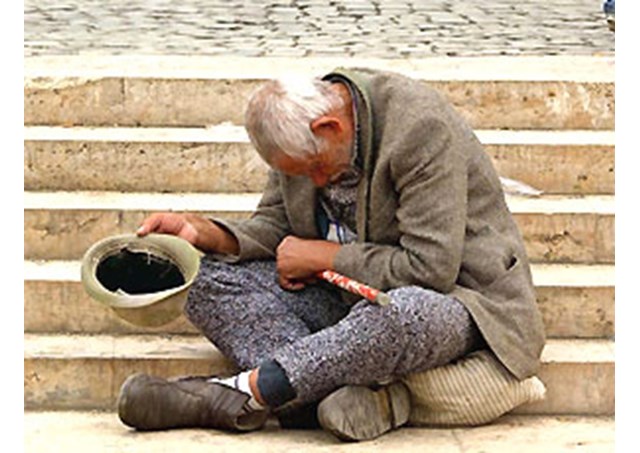How should the poor be treated according to the Bible?

How should the poor be treated according to the Bible? Should they work for any help they receive? What leads to poverty?
There are two types of poor people in the Bible. The first type are those who are truly destitute and needy, many times because of them. The second type are those who are affected by poverty but are skilled people who are lazy. Either they will not work in order not to earn a living or they will simply refuse to work also for the help offered (see Proverbs 6:10 - 11, 10: 4, etc.). They are poor more by choice than by chance.
Some people end up being poor due to the destruction of their crop due to a natural disaster. A large fire can cause the loss of a family's home and livelihood. After the death of a husband, a widow may find that she has very little money and no family to help her.
Without parents, an orphaned child becomes destitute and poor in circumstances beyond his control. Still others have poverty that overcomes them because of illnesses or handicaps that forbid them to make money.
God's will is that we develop a heart of compassion for the poor and afflicted and, whenever possible, provide them with the necessities of life. These needs include food, accommodation and clothing. Jesus taught that even though our enemy needs the essentials of life, we should still help him (Matthew 5:44 - 45).
The first New Testament church wanted to help the less fortunate. The apostle Paul not only remembered the poor (Galatians 2:10) but also encouraged others to do so. He wrote: "Therefore, since we have the opportunity, we do good to all, especially to those who belong to the house of faith" (Galatians 6:10).
The apostle James not only states that it is our duty to help those in poverty, but he also warns that offering them useless platitudes is not enough (James 2:15 - 16, see also Proverbs 3:27)! It defines true worship of God as involving visiting orphans and widows in their problems (James 1:27).
The Bible offers us principles regarding the treatment of the poor. For example, although God does not show bias because someone is needy (Exodus 23: 3, Ephesians 6: 9), he is concerned about their rights. He does not want anyone, especially leaders, to take advantage of the needy (Isaiah 3:14 - 15, Jeremiah 5:28, Ezekiel 22:29).
How seriously does God take the treatment of those less fortunate than ourselves? The Lord considers those who mock the poor as mocking him, "He that makes fun of the poor rebukes his Creator" (Proverbs 17: 5).
In the Old Testament, God commanded the Israelites not to gather the corners of their fields so that the poor and outsiders (travelers) could gather food for themselves. This was one of the ways the Lord taught them about the importance of helping those in need and opening their hearts to the condition of those who are less fortunate (Leviticus 19: 9-10, Deuteronomy 24:19-22).
The Bible wants us to use wisdom when we help the poor. This means that we should not give them everything they ask for. Those who receive assistance should expect (as far as they are able) to work for it and not simply get "something for nothing" (Leviticus 19: 9 - 10). The skilled poor should do at least some work or they shouldn't eat! Those who are able but refuse to work should not be helped (2Talessonians 3:10).
According to the Bible, when we help those who are poor we should not do it reluctantly. We should also not help the less fortunate because we think we should do it to please God. We are commanded to offer help with a willing and generous heart (2 Corinthians 9: 7).